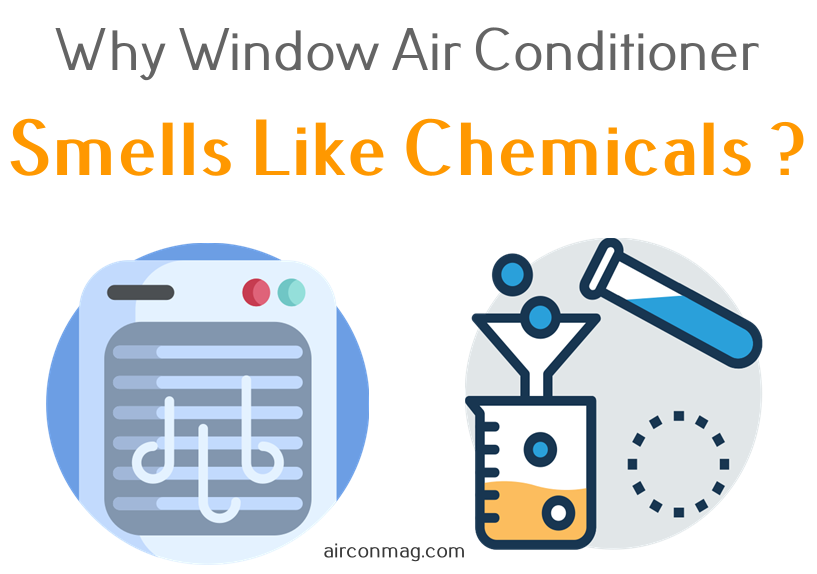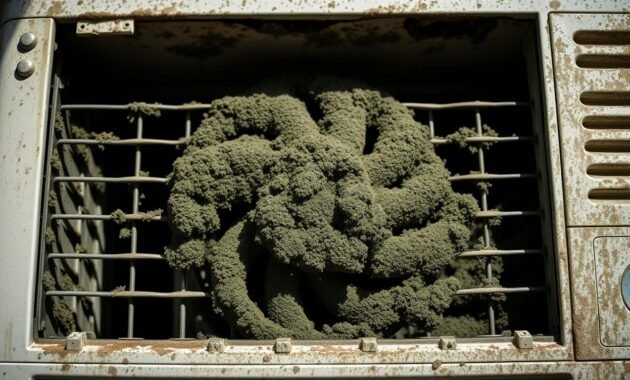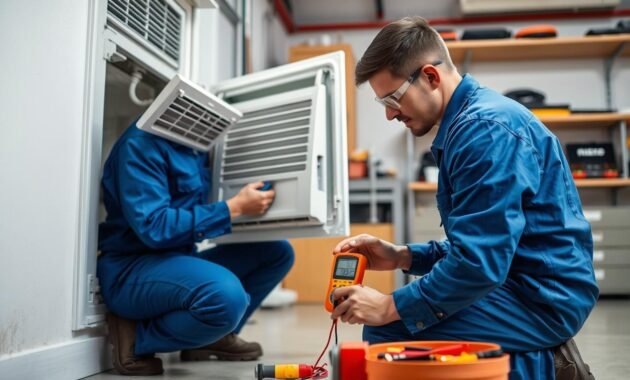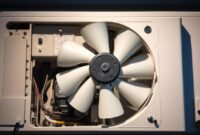Is your window air conditioner giving off a weird chemical smell? This smell might be more than just annoying. It could mean there’s a bigger problem that needs fixing right away.
These smells aren’t just bad for your nose. They could mean serious issues like refrigerant leaks or electrical problems. If you ignore the smell, you might face costly repairs, health issues, and poor air quality inside your home.
Read also: Why Do I Find Ice Build-Up on My AC Unit?
I’ll help you figure out what these smells mean, find the cause, and fix your air conditioner. This way, your home will stay safe and comfy again.

Understanding Common AC Odors and Their Causes
When your window air conditioner starts giving off strange smells, it’s important to know what they mean. Different smells can point to different problems with your cooling system. These issues can also affect the air you breathe indoors.
Window AC units can smell like chemicals, from strong smells to faint toxic odors. These smells are often signs of problems in your air conditioner.
Types of Chemical Smells from Air Conditioners
Knowing the type of smell can help figure out what’s wrong:
- Sweet, chloroform-like smell: Possible refrigerant leak
- Burning plastic odor: Possible electrical component damage
- Musty, moldy scent: Possible mildew growth inside the unit
- Sharp, acidic smell: Possible wire insulation breakdown
Health Risks Associated with AC Chemical Odors
Long-term exposure to bad smells from air conditioners can be harmful. These smells can cause breathing problems, headaches, and allergies.
| Odor Type | Potential Health Impact | Recommended Action |
|---|---|---|
| Refrigerant Leak | Respiratory irritation | Immediate professional inspection |
| Electrical Burning | Potential toxic exposure | Disconnect and repair |
| Mold Smell | Allergic reactions | Thorough cleaning |
Impact on Indoor Air Quality
Chemical smells from window air conditioners can really hurt the air quality inside. These smells spread through your home, which can harm your breathing and comfort. Keeping your AC well-maintained and checking for strange smells is important for clean air.
Window Air Conditioner Smells Like Chemicals: Main Causes and Solutions
Noticing chemical smells from your window AC can be scary. These smells mean there might be serious problems. Knowing what causes these smells is key to keeping you and your AC safe.
The main reasons for these smells fall into three main areas:
- Refrigerant Leaks: Producing a sweet, chloroform-like scent
- Electrical Component Malfunctions: Creating burning plastic odors
- External Chemical Contamination: Introducing foreign smell sources
Refrigerant leaks are the biggest worry. When your AC’s coolant leaks, it releases harmful vapors. These leaks can come from damaged coils or loose connections. A pro HVAC tech can find and fix these problems.
Electrical issues can smell like burning plastic. This might mean overheating parts or bad wiring. If you smell this, unplug your AC and get a pro to check it out to avoid fires.
Chemicals near your AC can also cause smells. Cleaning products or paint can get sucked into the AC. Keep your AC away from these chemicals to avoid smells.
Act fast if you notice chemical smells. Some problems might be small, but others could be big and need a pro.
Identifying Refrigerant Leaks in Window AC Units
A refrigerant leak can turn your window air conditioner into a health risk. These leaks often smell like chemicals, showing something’s wrong. Knowing how to spot and fix a refrigerant leak is key for your AC’s health and your home’s air.
Signs of Refrigerant Problems
Spotting a refrigerant leak early can save you money. Here are signs your window AC might have a problem:
- Sweet, chemical-like odor resembling paint thinner
- Reduced cooling efficiency
- Ice formation on evaporator coils
- Unusual hissing sounds from the unit
- Warm air blowing instead of cool air
Emergency Steps for Refrigerant Leaks
If you think there’s a refrigerant leak, act fast. First, turn off the air conditioner. Open windows to let in fresh air and reduce chemical smell. Don’t try to fix it yourself, as it needs special training and tools.
Professional Repair Options
Fixing an AC chemical smell from a refrigerant leak needs a pro. Certified HVAC technicians can:
- Find where the refrigerant leak is
- Fix or replace damaged parts safely
- Put back the right amount of refrigerant
- Check if the system works right
Remember, refrigerant leaks are not for DIY fixes. Keep yourself and your AC safe by getting help from experts when you see these signs.
Mold and Mildew: A Common Source of AC Odors

Mold and mildew can turn your window air conditioner into a health risk. They love the dark, damp places in your AC, like the evaporator coil. The musty smell is a sign of mold and mildew growing.
Moisture is what makes mold and mildew grow. If your AC’s drainage is bad, water can stay in the unit. This water is perfect for mold and mildew to grow.
- Check for visible mold growth on the evaporator coil
- Inspect the drain pan for standing water
- Look for discoloration or dark spots inside the unit
Ignoring mold and mildew can lead to health issues. Cleaning your air conditioner regularly is key. Clean it at least twice a year to stop mold and mildew.
It’s better to prevent mold and mildew than to treat them. Keep your AC dry, ensure good drainage, and have good airflow. This will help keep your AC mold-free.
Read also: What Does Freon Smell Like?
How to Clean Your Window Air Conditioner’s Components
Keeping your window unit clean is key to avoiding chemical smells and keeping it running well. Regular upkeep can get rid of odors and make your air conditioner last longer. I’ll show you how to clean the important parts of your window unit.
Cleaning your air conditioner right is important. It helps get rid of bad smells and keeps the air clean.
Cleaning the Air Filter
The air filter is very important for your window unit’s performance and air quality. Here’s how to clean it well:
- Remove the filter carefully from the unit
- Vacuum loose dust and debris
- Wash with mild soap and warm water
- Rinse thoroughly and allow to dry completely
- Reinstall the clean air filter
Sanitizing the Evaporator Coil
If your window unit smells like chemicals, the evaporator coil might be the problem. To clean the coil:
- Turn off and unplug the air conditioner
- Use a soft brush to remove loose debris
- Apply a commercial coil cleaner made for AC units
- Gently clean with a soft cloth
- Allow the coil to dry completely
Maintaining the Drain Pan
A clean drain pan stops moisture buildup and mold growth. Here’s how to clean it:
- Remove the drain pan carefully
- Wash with a mixture of water and mild detergent
- Rinse thoroughly
- Check for any blockages in the drain hole
- Dry completely before reinstalling
Cleaning frequency depends on how much you use it. But, clean these parts at least twice a year to avoid odors and keep it efficient.
| Component | Cleaning Frequency | Potential Issues if Not Cleaned |
|---|---|---|
| Air Filter | Every 1-2 months | Reduced airflow, increased energy consumption |
| Evaporator Coil | Annually | Chemical odors, decreased cooling efficiency |
| Drain Pan | Every 3-4 months | Mold growth, water leakage |
Preventing Chemical Smells Through Regular Maintenance
To keep your window air conditioner smelling fresh, you need to take care of it regularly. I’ve found that by doing so, you can avoid bad smells and health risks.
Starting a regular maintenance routine is key to solving the chemical smell problem. Here’s a simple plan to keep your air conditioner in great shape:
- Monthly tasks:
- Clean or replace air filters
- Inspect the unit for any signs of moisture or mold
- Check electrical connections
- Seasonal maintenance:
- Deep clean the evaporator coils
- Clear the condensate drain line
- Inspect the unit’s exterior and seal any possible leak points
- Annual professional inspection:
- Comprehensive system check
- Refrigerant level verification
- Electrical system evaluation
Keeping your air handler’s area clean is also important. Make sure the space around it is free from chemicals. Don’t store cleaning products or paint near it, as they can harm your air.
Regular upkeep not only gets rid of bad smells but also makes your air conditioner last longer. A little effort goes a long way in keeping your air cool and fresh.
When to Replace vs. Repair Your Window AC Unit
Choosing between fixing or replacing a window AC unit can be tough, mainly when you face constant chemical smells. I’ve learned that sometimes, getting a new AC is the smartest move.
Several key factors influence the decision to replace your window air conditioner:
- Age of the current air conditioning unit
- Frequency of chemical smells
- Repair costs compared to replacement
- Energy efficiency of existing equipment
Age and Efficiency Considerations
Window air conditioners usually last 8-10 years. If your unit is getting old and smells like chemicals, it might be time for a new one. New models are more energy-efficient, which can lower your electricity bills.
Cost Analysis of Replacement
When thinking about replacing, compare repair costs to a new unit’s price. If repairs cost more than half of a new AC’s price, getting a new one is better for your wallet.
Environmental Factors
Today’s window air conditioners use cleaner refrigerants and better filters. Upgrading can help the environment and get rid of those annoying chemical smells.
If your window AC smells like chemicals all the time and fixes don’t help, it’s time for a new one. This will improve your air quality and performance.
Professional Inspection and Repair Services

Dealing with air conditioner chemical odors can be tough. Professional HVAC technicians are here to help. They have the tools and knowledge to find and fix AC smell problems that homeowners can’t solve.
Certified HVAC experts provide detailed services to tackle ac chemical smell issues. They know how to handle various sources of chemical odors, such as:
- Refrigerant leaks
- Electrical component damage
- Mold and mildew contamination
- Damaged internal wiring
When choosing a professional service, look for these qualities:
- EPA-certified
- Experienced with window air conditioning units
- Equipped with advanced diagnostic equipment
- Willing to provide detailed inspection reports
Professional inspections include detailed diagnostic tests. Technicians will find the exact cause of the odor. They’ll explain the problem and give clear cost estimates before starting work.
Choosing professional HVAC services can save you money in the long run. It prevents system failures and keeps your air conditioning unit running safely and efficiently.
Safety Measures and Indoor Air Quality Solutions
When you notice a toxic smell from your air conditioner, safety and air quality are top priorities. Chemical fumes from window AC units can be harmful. So, it’s important to act fast.
- Immediately turn off the air conditioning unit
- Open windows to create cross-ventilation
- Use portable air purifiers with activated carbon filters
- Wear a respirator mask if chemical smell is strong
Improving indoor air quality is easier than you think. Use fans near windows to push bad air out and bring in fresh air. Air purifiers with HEPA and activated carbon filters are great at catching chemical particles and removing odors.
Read also: What Does Freon Smell Like?
| Indoor Air Protection Method | Effectiveness | Cost Range |
|---|---|---|
| HEPA Air Purifier | High | $100-$500 |
| Activated Carbon Filter | Medium-High | $50-$200 |
| Natural Ventilation | Low-Medium | Free |
If smells keep coming back or get too strong, leave the area and call HVAC experts. Your health is more important than fixing the equipment.
Conclusion
Dealing with a window air conditioner chemical smell needs careful attention and regular upkeep. I’ve found that knowing the cause is key to keeping you and your system safe. Issues like refrigerant leaks, mold, or electrical problems can be serious.
Regular maintenance is your best defense against these smells. Clean filters, check for mold, and get professional checks yearly. This way, you can avoid most problems and keep your air conditioner running smoothly.
If you notice strange smells, safety comes first. If you’re not sure what’s causing it, call a professional HVAC technician. They can fix the issue and keep your home cool and safe.
A well-kept air conditioner is more than just cooling. It’s an investment in your home’s air quality and your family’s health. Trust your instincts, act fast, and enjoy clean air in your home.


